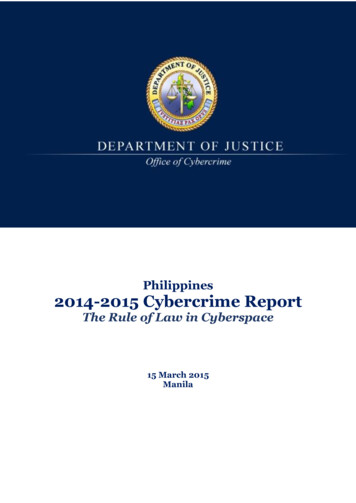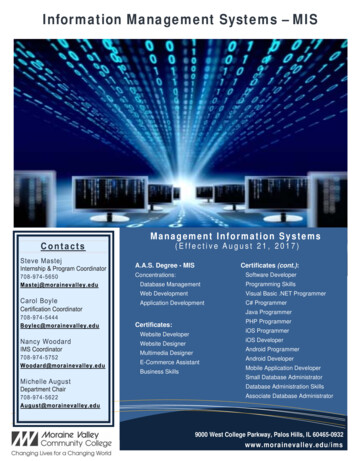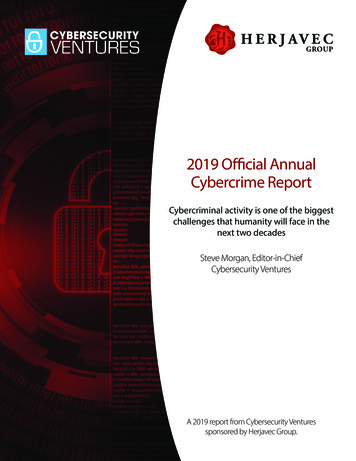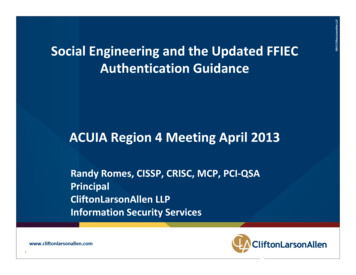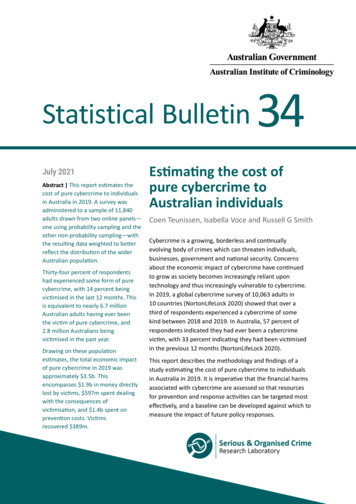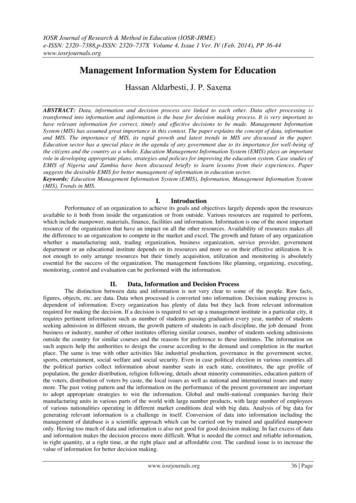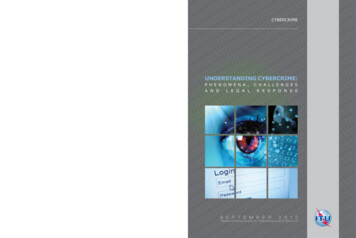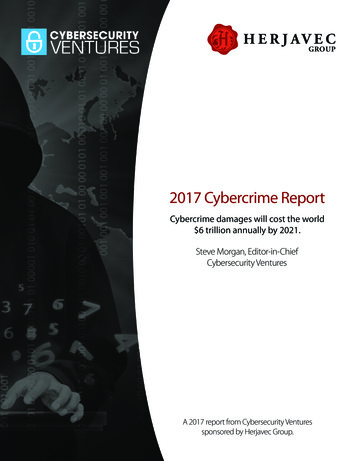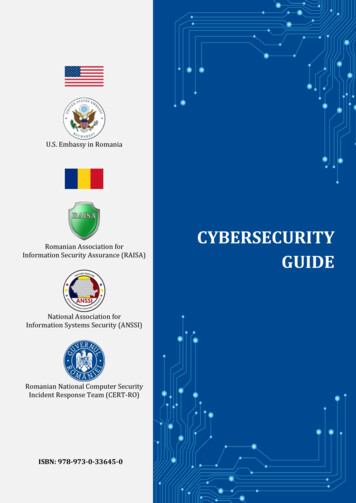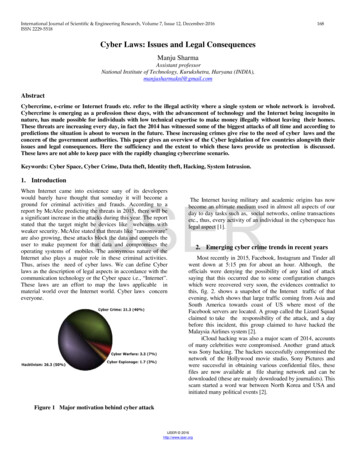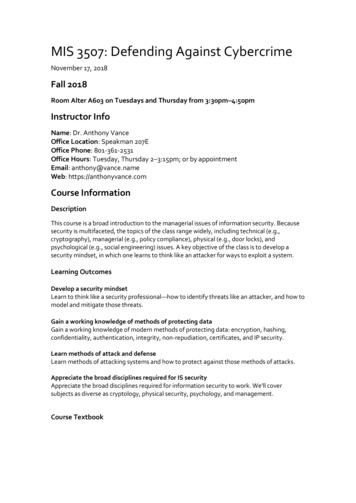
Transcription
MIS 3507: Defending Against CybercrimeNovember 17, 2018Fall 2018Room Alter A603 on Tuesdays and Thursday from 3:30pm–4:50pmInstructor InfoName: Dr. Anthony VanceOffice Location: Speakman 207EOffice Phone: 801-361-2531Office Hours: Tuesday, Thursday 2–3:15pm; or by appointmentEmail: anthony@vance.nameWeb: https://anthonyvance.comCourse InformationDescriptionThis course is a broad introduction to the managerial issues of information security. Becausesecurity is multifaceted, the topics of the class range widely, including technical (e.g.,cryptography), managerial (e.g., policy compliance), physical (e.g., door locks), andpsychological (e.g., social engineering) issues. A key objective of the class is to develop asecurity mindset, in which one learns to think like an attacker for ways to exploit a system.Learning OutcomesDevelop a security mindsetLearn to think like a security professional—how to identify threats like an attacker, and how tomodel and mitigate those threats.Gain a working knowledge of methods of protecting dataGain a working knowledge of modern methods of protecting data: encryption, hashing,confidentiality, authentication, integrity, non-repudiation, certificates, and IP security.Learn methods of attack and defenseLearn methods of attacking systems and how to protect against those methods of attacks.Appreciate the broad disciplines required for IS securityAppreciate the broad disciplines required for information security to work. We'll coversubjects as diverse as cryptology, physical security, psychology, and management.Course Textbook
Required textbook: “Security Engineering: A Guide to Building DependableDistributed Systems 2nd Edition,” by Ross Anderson.Free PDF of the book: http://www.cl.cam.ac.uk/ rja14/book.htmlAmazon: http://a.co/9bzf6zPOptional: “Secrets and Lies: Digital Security in a Networked World,” by BruceSchneier.Excellent overview of information security, from cryptography to authentication,and to the human factor.Available online via Temple Library: https://goo.gl/ty5y2ZAmazon: https://amzn.com/0471453803Participation PolicyContribution will account for 5% of your final grade. Most students will earn 80% of thesepoints. Students who are exceptional and go above and beyond in enhancing the classroomexperience may receive a higher score.The following list is not comprehensive, but rather an example of items weighted in thecontribution category: Providing feedback on the class via the course evaluation Treating others with respect Showing courtesy for presenters (guest speakers, instructor, students) Participating in class discussions Arriving on time and not leaving early Not using technology inappropriately (distracting yourself or others)Classroom ProceduresIt is alright to use your laptop to take notes, but do not use it for non-class related activities.Not only does this diminish your learning experience, but it distracts those around you.Out of respect for our guest speakers, do not use electronic devices (e.g., laptops and cellphones) during their presentations. If you want to take notes, please do so on paper.AssignmentsMidterm Project ReportThis is a group project. The midterm will be a vulnerability and penetration assessment reportof a server. On Friday, October 5th, Teams of students will be given an IP address of a serverto assess for security weaknesses. The midterm report will be due two weeks later on Friday,October 19th.Readings QuizzesMost readings and videos on the schedule have associated quizzes. Quizzes are open book,open Internet and must be completed within 30 minutes.
You can take these on Canvas. Quizzes are due by 2:30pm on the date due.LabsLabs are hands-on learning activities that will be begun in class and completed outside ofclass. Labs are typically due one week after they are introduced in class.Threat Assessment ProjectThis is a group project. Teams will choose a recent security incident, summarize whathappened, and give recommendations for how the threat could have been better managed.The report will also include a risk assessment of other potential threats the chosenorganization faces, along with recommendations for mitigating each identified threat.Deliverables include a written report due on December 6th.Required ReadingYou are required to read one of the books on the "Security Readings” list at the end of thisdocument by the last day of class, December 6th. To receive credit, submit your report via aquiz posted on Canvas. Indicate which book you read, whether you read the whole book, andgive your brief reaction to it.For extra credit, you may read an additional security book from the list of security books orone approved by Dr. Vance to replace your lowest lab score. If you choose this option, submityour report through this quiz by the last day of class, December 6th.Required Security FilmsTwo films are required viewing for this course: "Zeros Days" and "Citizenfour." To receivecredit, watch each film and simply indicate that you watched the whole film and give yourbrief reaction to the film on a quiz posted on Canvas.“Citizenfour” by Laura PoitrasThe 2015 Academy Award winner for Best Documentary Feature,this film tells the story of Edward Snowden and the NSA spyingdisclosures of 2013.Availability: ed R. Edited version available on Vidangel.com.
“Zero Days” by Alex GibneyA 2016 documentary about Stuxnet and the advent ofcyberwarfare.Availability: https://www.justwatch.com/us/movie/zero-daysRated PG-13. Edited version available on Vidangel.com.For extra credit, you may watch either "The Lives of Others" or "The Conversation" toreplaced one missed quiz. To receive credit, complete this quiz by the last day of class,December 6th.“The Lives of Others” by F. Henckel von DonnersmarckThe 2007 Oscar winner of Best Foreign Language Film of the Year,this film tells the story of a secret police agent in East Berlin in1984 who surveils a writer and becomes increasingly absorbed inhis life.Availability: ersRated R. Edited version available on Vidangel.com.“The Conversation” by Francis Ford CoppolaA classic 1974 film psychological thriller starring Gene Hackmanthat revolves around surveillance. It is more relevant today thanwhen it debuted.Availability: Rated PG. Edited version available on Vidangel.com.Late WorkAll assignments and projects are to be submitted on time or early, so plan accordingly. If youhave to miss class please submit your assignment early. On rare occasions, an exception maybe granted, allowing the student to submit the work late with a 20% penalty. Under nocircumstances will anything be accepted more than a week late.Certification OptionAs an option, students seeking certification may replace the final exam by passing theSecurity certification or another certification approved by the instructor. You can substituteyour score on the certification (plus an adjustment—5% for the Security ) for the final. For
example, if you received an 85% on the Security exam you would receive a 90% for your finalexam score.To receive credit for the certification, a student must show evidence of having taken thecertification exam by the last day of class (5/1). If a student doesn't show the instructorevidence of passing the certification by this date, then he/she will be required to take thefinal exam.Point BreakdownCategoryLabsFinal examMidtermQuizzesSecurity book quizThreat assessment projectSecurity films quizzesParticipationCourse ding ScaleGradesAAB BB-Scaled Points930 points900 points870 points830 points800 pointsC CCD DDE770 points730 points700 points670 points630 points600 points599 points or 8TopicIntroduction to the CourseAssignmentsAnderson, Ch. 1Threat modelingRead the beginningof each chapter,skim the rest of thechapter:
“Threat Modeling,”by Adam Shostack,Introduction,Chapter 1, Chapter4Optional:Schneier, Chapter21Tuesday,9/4/2018Introduction to uesday,9/18/2018Thursday,9/20/2018Symmetric CryptographyTuesday,9/25/2018Deadline to submit Lab 1: Threat ModelingQuiz: Anderson,Ch. 5, pp. 129-149Lab 1: ThreatModelingAsymmetric CryptographyIn-class video: "Codes," History Chanel episode of"Modern Marvels"Deadline to email your PGP public key to Dr.Vance at anthony@vance.name.Digital Certificates and PKIAuthentication and PasswordsPassword CrackingAnderson Ch. 2, pp.31-39, 56-58Lab 2: SymmetricCryptographyGosney, "HowLinkedIn’spasswordsloppiness hurts usall"Goodin, "Whypasswords havenever beenweaker"Quiz: Goodin,"Why passwordshave never beenweaker"Lab 3: AsymmetricCryptography
Thursday,9/27/2018Dr. Vance is out of town.Watch three of the following:Lab 4: DigitalCertificates andPKIEnigma 2017 talk: “The Paper Ballot Is Not Enough,”Ben Adida, VP of Engineering, Clever. Slides.Enigma 2017 talk: “Inside "MOAR TLS:" How WeThink about Encouraging External HTTPS Adoptionon the Web.” Emily Schechter, Google. Slides.Enigma 2017 talk: “What Cybersecurity Can Learnfrom the Secret Service,” Nathaniel Gleicher, Headof Cybersecurity Strategy, Illumio. Slides.Enigma 2017 talk: “Drawing the Foul: Operation of aDDoS Honeypot,” Damian Menscher, SecurityReliability Engineer, Google. Slides.Enigma 2016 talk: "Why Is Usable Security Hard,and What Should We Do about It?" Adrienne PorterFelt, Staff Software Engineer, Google /23/2018Thursday,10/25/2018Enigma 2016 talk: "Disrupting Nation StateHackers," Rob Joyce, Chief, Tailored AccessOperations, National Security Agency. Slides.Introduction to LinuxVulnerability ScanningLab 5: PasswordCrackingVulnerability ExploitationIn-class LabMidterm beginsNo class, work on midtermOptional: Exploitation tutorialPhysical securityMidterm report dueThe Human Element of SecurityLab 6:VulnerabilityScanningLab 7:ExploitationQuiz: Anderson,Chapter 11Online video: BruceSchneier, TheSecurity Mirage"Cosmo, theHacker ‘God’ Who
Tuesday,10/30/2018Network Security Monitoring and 8Network Security Monitoring In-class LabThursday,11/8/2018Information PrivacyElections SecurityFell to Earth," byMat Honan.“Network SecurityMonitoring,” byRichard Bejtlich,Chapter 1Lab 8: PhysicalSecurity2:30pm Quiz: KimZetter, “The Crisisof ElectionSecurity”Lab 9: SocialEngineeringQuiz: Tim Cook,“'Technology canharm, can help”Tuesday,11/13/2018Information Security in OrganizationsThursday,11/15/2018Class canceled due to y,11/27/2018Fall break, no classQuiz:“Citizenfour” filmLab 10: NetworkSecurityMonitoringQuiz: Introductionand Chapter 0 ofPractical MalwareAnalysis by Sikorskiand Honig.ThanksgivingMalware AnalysisQuiz: Zero DaysfilmQuiz: Introductionand Chapter 0 ofPractical MalwareAnalysis by Sikorskiand Honig.Lab 11: uest speaker: Christopher KearnsDepartment Head, Hosting InfrastructureEngineering at VanguardSecurity and TerrorismLab 12: MalwareAnalysis
Thursday,12/6/2018Course wrap-upThreatAssessmentProject dueBook report dueExtra credit film,book reports 12/19/2018Study dayFinal exams beginLast day of final examsSelected Security Books by Bruce Schneier“Secrets and Lies: Digital Security in a Networked World,” by Bruce Schneier.Excellent overview of information security, from cryptography to authentication tothe human factor.Available online via Temple Library: https://goo.gl/ty5y2ZAmazon: https://amzn.com/0471453803“Data and Goliath: The Hidden Battles to Collect Your Data and Control YourWorld,” by Bruce Schneier.Great book about the threats of surveillance to society, and what we can do aboutit. After reading the book, you probably won’t view surveillance the same wayagain.Available at Temple LibraryAmazon: http://amzn.com/0393244814“Liars and Outliers: Enabling the Trust that Society Needs to Thrive,” by BruceSchneier.Interesting book about how security enables trust that society needs to function.Available online via Temple LibraryAmazon: https://amzn.com/1118143302“Beyond Fear,” by Bruce Schneier.This book is about national security, terrorism, and how to think sensibly aboutwhether security measures are worth the cost to society.Available at Temple LibraryAmazon: https://amzn.com/1475781199
Other Excellent Security BooksThe Cuckoo’s EggClassic security novel—the true story of how a network admin got caught up inglobal computer espionage using network security monitoring. Reads like a thriller.Available at Temple LibraryAmazon: http://amzn.com/1416507787“The Ghost in the Wires” by Kevin MitnickAutobiography of Kevin Mitnick, famed computer hacker and social engineer. Inaddition to being a very entertaining and fascinating read, you’ll learn a lot aboutsocial engineering techniques from the accounts of his experiences.Available at Temple LibraryAmazon: http://amzn.com/0316037729“Kingpin: How One Hacker Took Over the Billion-Dollar Cybercrime Underground,”by Kevin Poulsen.Amazon: http://amzn.com/0307588696“The Code Book” by Simon Singh.This is a very interesting and gripping book about the history and intrigue ofcryptography and cryptanalysis.Available at Temple LibraryAmazon: http://amzn.com/0470474246“Crypto: How the Code Rebels Beat the Government Saving Privacy in the DigitalAge” by Steven Levy.A very engaging look at the modern history of cryptography, including thedevelopment of DES, RSA, and PGP. Also, it describes the fight in the 1990’s tolegalize the use of strong cryptography.Available at Temple LibraryAmazon: http://amzn.com/0140244328
“Countdown to Zero Day: Stuxnet and the Launch of the World's First DigitalWeapon,” by Kim Zetter.Interesting and compelling read about the discovery of Stuxnet and how it changedthe world.Available at Temple LibraryAmazon: http://amzn.com/077043617X“Spam Nation: The Inside Story of Organized Cybercrime-from Global Epidemic toYour Front Door,” by Brian Krebs.In Spam Nation, investigative journalist Brian Krebs unmasks the criminalmasterminds driving some of the biggest spam and hacker operations targetingAmericans and their bank accounts. Tracing the rise, fall, and alarming resurrectionof the digital mafia behind the two largest spam pharmacies-and countless viruses,phishing, and spyware attacks-he delivers the first definitive narrative of the globalspam problem and its threat to consumers everywhere.Amazon: http://amzn.com/1402295618“Dragnet Nation: A Quest for Privacy, Security, and Freedom in a World ofRelentless Surveillance,” by Julia AngwinAward-winning journalist Julia Angwin reports from the front lines of America’ssurveillance economy, offering a revelatory and unsettling look at how thegovernment, private companies, and even criminals use technology toindiscriminately sweep up vast amounts of our personal data.Available at Temple LibraryAmazon: http://amzn.com/0805098070“Nothing to Hide” by Daniel SoloveA book that debunks the most common attack to privacy arguments.Available online via Temple LibraryAmazon: http://amzn.com/0674035070“Practical Lock Picking, Second Edition: A Physical Penetration Tester’s TrainingGuide” by Deviant OllamThe best book available to learn lock-picking.Available online via Temple LibraryAmazon: http://amzn.com/1597499897
“Keys to the Kingdom: Impressioning, Privilege Escalation, Bumping, and OtherKey-Based Attacks Against Physical Locks” by Deviant OllamAnother great and accessible book on more advanced lock-picking by DeviantOllam.ScienceDirect (free through cle/pii/B9781597499835000105Amazon: http://amzn.com/1597499838The Practice of Network Security Monitoring by Richard BeijtlichExcellent book on the principles of NSM and how to get started with SecurityOnion.Available online via Temple LibraryAmazon: http://amzn.com/1593275099“The Art of Deception” by Kevin MitnickIn-depth discussion of the techniques of social engineering and how to educateyour organization to be less susceptible to these attacks.Available at Temple LibraryAmazon: http://amzn.com/076454280X“Social Engineering” by Christopher HadnagyAnother well-regarded book on social engineering, from the organization thatoperates the Social Engineer Village at DEFCON.Available online via Temple LibraryAmazon: http://amzn.com/0470639539“Unmasking the Social Engineer,” by Chris Hadnagy.From the publisher: “Unmasking the Social Engineer: The Human Element ofSecurity focuses on combining the science of understanding non-verbalcommunications with the knowledge of how social engineers, scam artists and conmen use these skills to build feelings of trust and rapport in their targets.”Available online via Temple LibraryAmazon: http://a.co/d1A6C17
Authentication and Passwords Anderson Ch. 2, pp. 31-39, 56-58 . Lab 2: Symmetric Cryptography . Tuesday, . Engineering at Vanguard Tuesday, 12/4/2018 Security and Terrorism Lab 12: Malware Analysis . . from cryptography to authentication to the human factor. Available online via Temple Library: https://goo.gl/ty5y2Z
